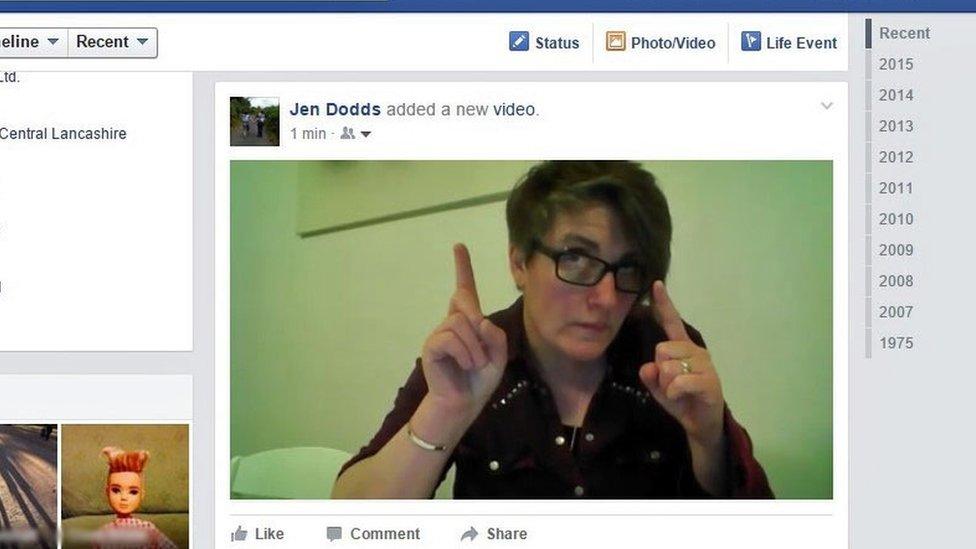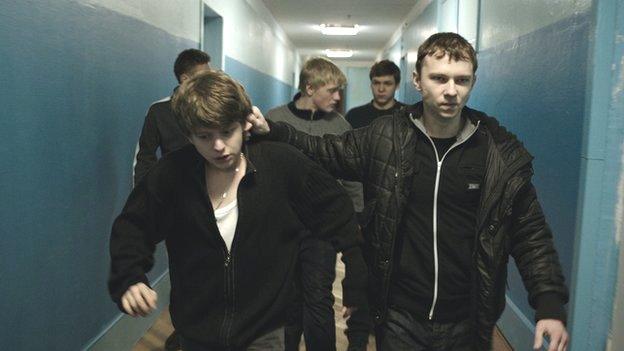Why Facebook has become so important to the sign language community
- Published
Watch a signed version of this article
Sign language users once had to meet at local deaf clubs to have conversations and share their views. Now, video on social media means things have changed, says deaf journalist Charlie Swinbourne.
There was a time when sign language users had to go to a local club to shoot the breeze, share advice or have any kind of conversation. It's not as if you could just pick up the phone for a chat. Deaf clubs were a real community hub full of friends, families, board games and a barman.
In recent years, though, social media sites have started to replace the deaf club, with Facebook leading the way. Videos on newsfeed pages can be viewed for long periods and groups are easy to set up and join.
Last year, the importance of Facebook as an outlet for the sign language community was acknowledged at a high level when the Scottish Parliament set up a group on the site to gain supporting evidence for the groundbreaking British Sign Language (Scotland) Bill, which was passed in September, and aims to promote usage of the language.
When social media first became popular, the novelty for a sign language user was that they could appear just the same as anyone else via text. Many deaf people enjoyed being able to communicate more easily with their network of hearing colleagues, old school friends or family members for the first time.
But it wasn't perfect because status updates had to be written in English text. In BSL, meaning is communicated through hands, facial expressions and body language. It has a different grammar and structure. Because of difficulties with acquiring language without hearing, many BSL users see English as their second language and often aren't as fluent in English.
For example, in spoken English you might say: "The man climbed to the top of the big mountain." But in BSL you'd establish the mountain first, like this: "Mountain, big. Man climbed up it, all the way to the top." You'd show how steep the mountain was through your signs, and the effort the man took to climb it would be emphasised by your actions and facial expressions - almost like acting the part of the climber.
That's why, when mobile phones and tablets with high-resolution cameras arrived, sign language users started creating their status updates in video, not text, filming themselves signing. Now a typical deaf person's Facebook page is full of their friends signing, which is much more natural.
Video communication has led to some humorous quirks, such as the way that in some signed videos, instead of signing their name, people will sign "My name is…" then simply point in the air above their heads to where they know their name will appear in text when the video is posted to the site. So popular is Facebook that an in-joke has emerged whereby people at social events point above their heads after being asked their name.

Users of sign language have faced barriers to participating fully in mainstream Facebook groups because of the fact English isn't their first language. But now there are all kinds of deaf groups, and in particular a real explosion in spaces where BSL users share advice, such as Deaf Opinions (or "sharing advice" to give it its sign-name) which has over 7,000 members. At the time of writing, the issues being discussed are as varied as computer problems, the menopause, and how to keep flowers alive in water longer. Another group, Deafland UK, gives its members fun challenges every week, which replicate the kind of games deaf clubs used to put on.
It's this type of group in particular which provides the traditional function of a deaf club, but on a much larger scale.
Many think there are social benefits to online group-communication. Deaf comedian John Smith says: "Before we had social networking sites, many deaf people were isolated. Facebook is a place where we can release some of our frustrations about the barriers we face in everyday life." Deaf academic John Walker also points out how Facebook has offered a lifeline for deaf-blind people or those who are partially sighted and find it harder to communicate at events held for sign language users.
The signed Facebook groups are also reminiscent of deaf clubs due to the style of communication used.
Deaf people were often thought to be more direct due to the nature of their visually-based language. Correspondingly, there is a recent trend for some deaf people to open up on Facebook about depression and mental health issues, finding support in the responses they get. "Deaf people are generally more frank than hearing people," says Jen Dodds who runs a signed politics group, "this extends to social media too. Why wouldn't it?"
The movement to an online space means that deaf organisations such as the British Deaf Association (BDA) have had to adapt. David Buxton, Director of Campaigns and Communications, says: "The BDA produces a large amount of video in BSL for posting on Facebook. This means deaf people do not have to rely on written statements or stories which they sometimes find difficult to follow."
But Facebook isn't as good as it could be for deaf people. While status updates can be posted in video, Walker points out that once you hit "reply", the video option disappears and you have to revert to typing in English for all follow-up comments, and others point out how hard it can be to keep track of what people say because of the way updates fall quickly down timelines.
A more general concern is that Facebook's popularity could lead to more deaf clubs closing, and fewer opportunities for people to meet and sign with each other face-to-face.
Most deaf people feel like the benefits outweigh any negatives. As Buxton says: "Facebook gives deaf people the confidence to come out and say things that they never would have said before because they didn't have the platform to say it on. Confidence comes from being able to express your own thoughts in your own language - BSL."

More on deafness from BBC Disability

A Ukrainian film changes perceptions of what a deaf film can be, writes Charlie Swinbourne.

The signed version of this article is presented by Heidi Koivisto Robertson. Please give feedback to ouch@bbc.co.uk
For more Disability News, follow BBC Ouch on Twitter, external and Facebook, external, and subscribe to the weekly podcast.